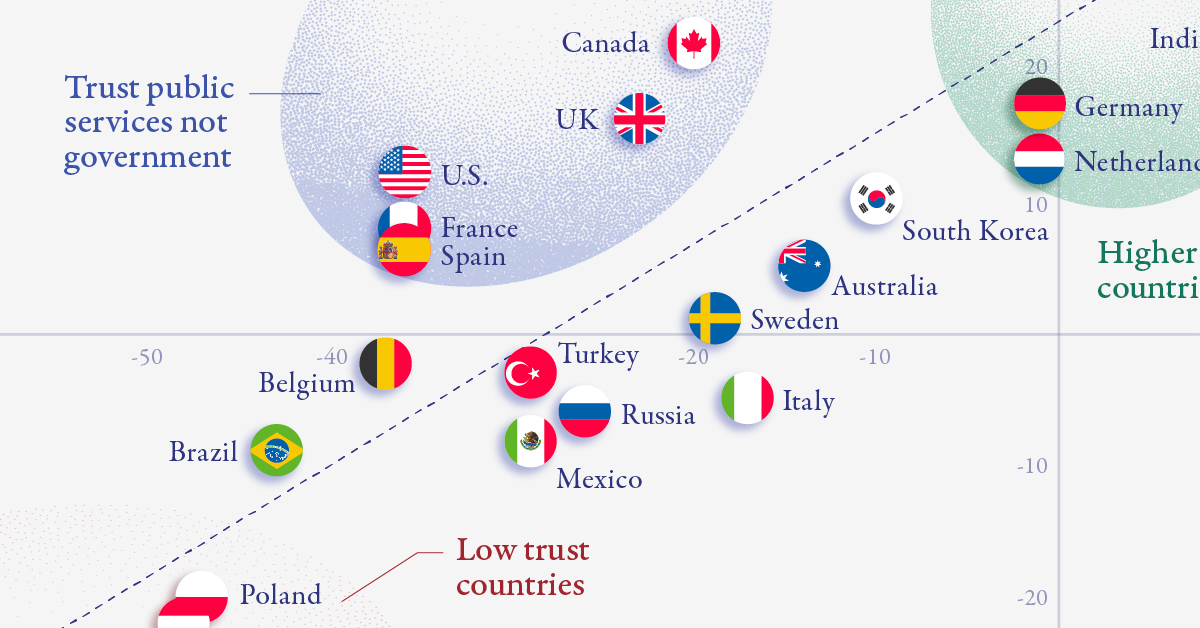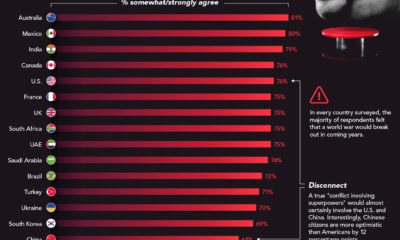Politics
Which Countries Trust Their Government, and Which Ones Don’t?
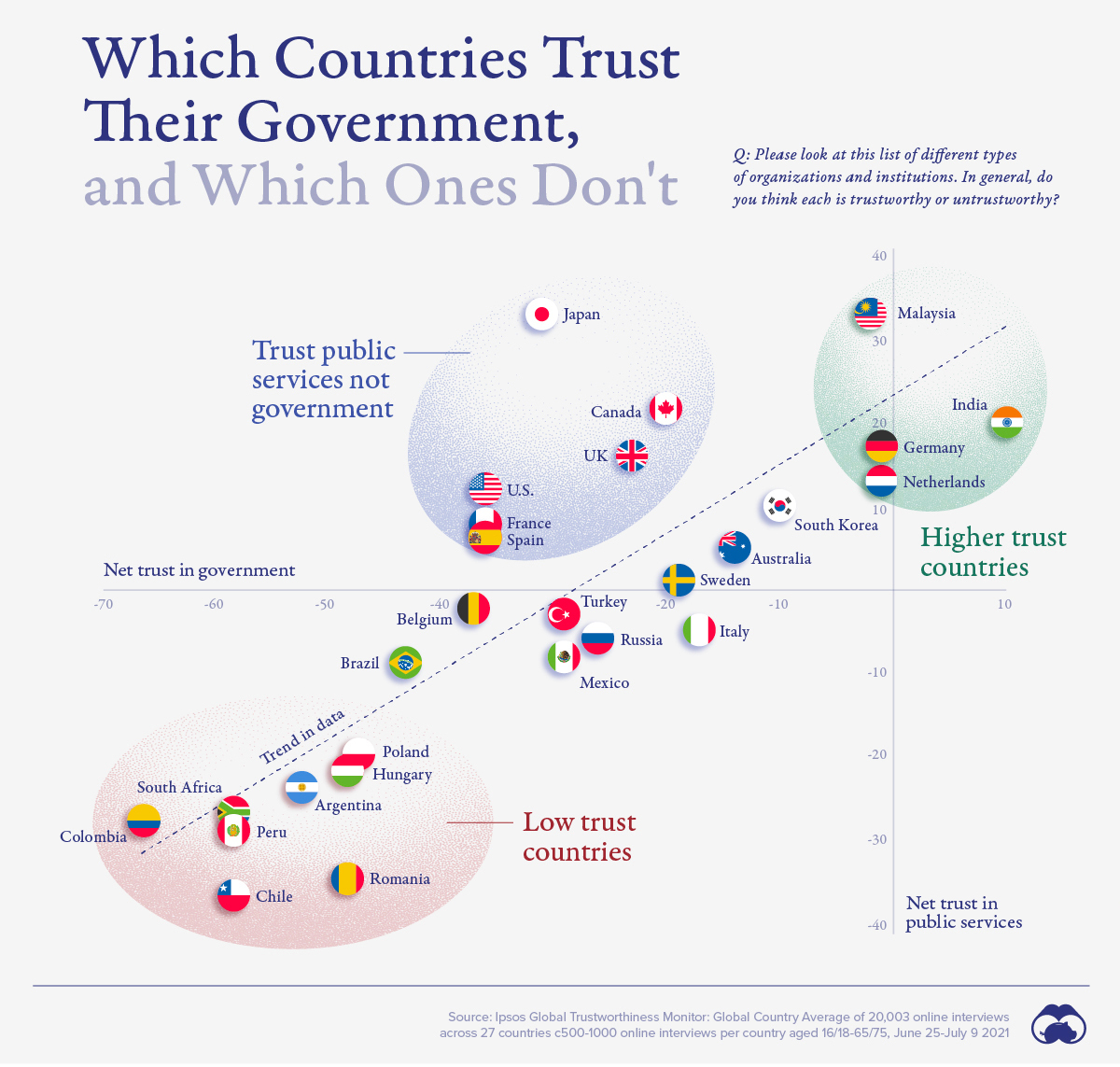
Which Countries Trust Their Government, and Which Ones Don’t?
In many countries around the world, vast portions of the population do not trust their own government.
Lack of faith in government and politics is nothing new, but in times of uncertainty, that lack of trust can coalesce into movements that challenge the authority of ruling parties and even threaten the stability of nations.
This visualization uses data from the Ipsos Global Trustworthiness Monitor to look at how much various populations trust their government and public institutions.
Tracking Trust in Government
Since the beginning of the pandemic, global trust in government has improved by eight percentage points, but that is only a small improvement on an otherwise low score.
At the country level, feelings towards government can vary widely. India, Germany, Netherlands, and Malaysia had the highest government trust levels.
Many of the countries with the lowest levels of trust were located in Latin America. This makes sense, as trust in politicians in this region is almost non-existent. For example, in Colombia, only 4% of the population consider politicians trustworthy. In Argentina, that figure falls to just 3%.
Trust in Public Institutions
Broadly speaking, people trust their public services more than the governments in charge of managing and funding them. This makes sense as civil servants fare much better than politicians and government ministers in trustworthiness.
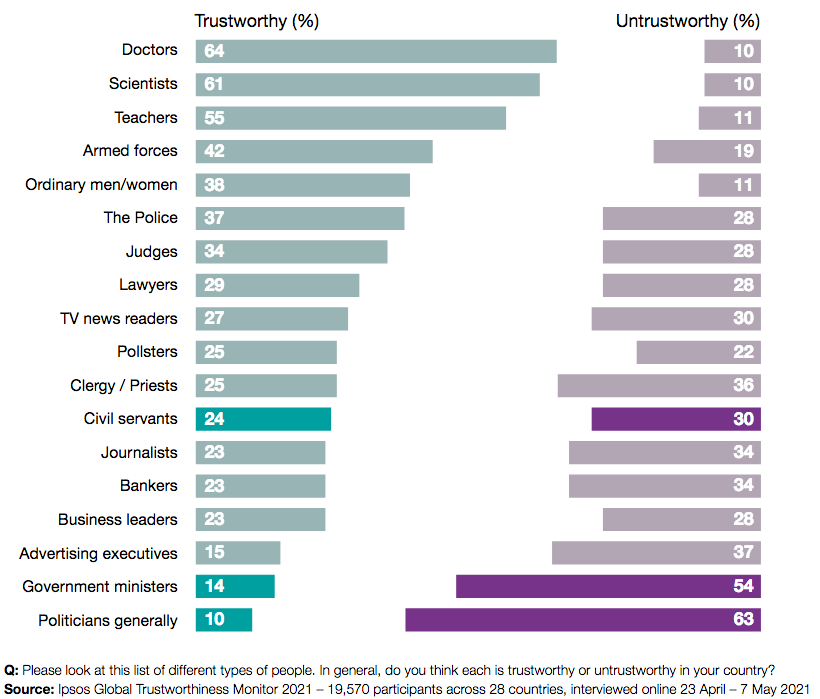
As our main chart demonstrates, there is a correlation between faith in government and trust in public institutions. There are clear “high trust” and “low trust” groupings in the countries included in the polling, but there is also a third group that stands out—the countries that have high trust in public institutions, but not in their government. Leading this group is Japan, which has a stark difference in trust between public services and politicians. There are many factors that explain this difference, such as values, corruption levels, and the reliability of public services in various countries.
While trust scores for government improved slightly during the pandemic, trust in public institutions stayed nearly the same.
Misc
How Do Chinese Citizens Feel About Other Countries?
What is the Chinese public’s view of world powers? This visual breaks down Chinese sentiment towards other countries.
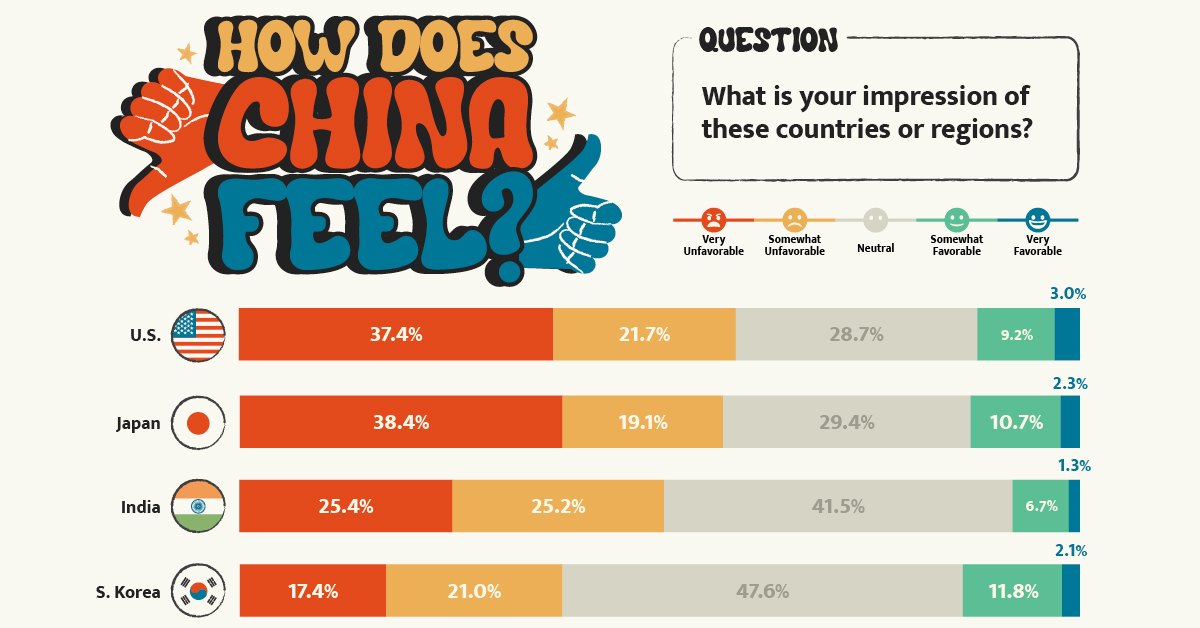
Public Opinion: How Chinese Citizens Feel About Other Countries
Tensions over Taiwan, the COVID-19 pandemic, trade, and the war in Ukraine have impacted Chinese sentiment towards other countries.
This visualization uses data from the Center for International Security and Strategy (CISS) at Tsinghua University to rank survey responses from the Chinese public on their attitudes towards countries and regions around the world.
Chinese Sentiment Towards Other Countries in 2023
In the Center’s opinion polls, which surveyed a random sample of more than 2,500 Chinese mainland adults in November 2022, Russia came out significantly ahead.
Just under 60% of respondents held Russia in a favorable view, with 19% seeing the country as “very favorable.” Contrast that to the mere 12% that viewed the U.S. in a positive light.
Here’s a closer look at the data. The percentages refer to the share of respondents that voted for said category.
| Country/Region | Very Unfavorable | Somewhat Unfavorable | Neutral | Somewhat Favorable | Very Favorable |
|---|---|---|---|---|---|
| 🇺🇸 United States | 37.4% | 21.7% | 28.7% | 9.2% | 3.0% |
| 🇯🇵 Japan | 38.4% | 19.1% | 29.4% | 10.7% | 2.3% |
| 🇮🇳 India | 25.4% | 25.2% | 41.5% | 6.7% | 1.3% |
| 🇰🇷 South Korea | 17.4% | 21.0% | 47.6% | 11.8% | 2.1% |
| 🇪🇺 European Union | 9.3% | 15.6% | 57.6% | 14.1% | 3.3% |
| Southeast Asia | 7.1% | 13.1% | 59.5% | 16.8% | 3.5% |
| 🇷🇺 Russia | 3.0% | 4.8% | 33.7% | 39.4% | 19.0% |
Japan ranked just below the U.S. in terms of overall unfavorability, though a slightly higher share of respondents saw Japan as “very unfavorable” compared to America. This is likely due to both modern tensions in the East China Sea over mutually claimed islands and historical tensions over the Sino-Japanese Wars.
Chinese sentiment towards India was also unfavorable at just over 50%, though notably the country also received the lowest favorability rating at just 8%.
Additional Survey Findings
The survey also found that 39% of Chinese people get their information on international security from Chinese state-run media (mainly through TV), with an additional 19% getting information from government websites and official social accounts. Conversely, only 1.7% get their news from foreign websites and foreign social media, partially due to the Great Firewall.
When asked about different international security issues, the biggest shares of Chinese citizens ranked the following as their top three:
- Pandemics (12.9%)
- Disputes over territory and territorial waters (12.9%)
- China-U.S. relations (12.0%)
The pandemic’s high score reflects the harsher impact COVID-19 had on China. Chinese borders were shut for years and the public faced intense measures to reduce spread.
In terms of other world events, the majority of Chinese people align with a more “Eastern” viewpoint. For example, in regards to the war in Ukraine, the report found that:
“About 80 percent of the respondents believe the U.S. and Western countries should be held most accountable [for the war], while less than ten percent of the respondents argue that Russia is mainly responsible.”– Center for International Security and Strategy, Tsinghua University
Overall, the views of the Chinese public reflect the opposite of those found in many Western countries. They provide an important insight that it is not just the Chinese government holding particular views about the world, but the Chinese public as well.
-
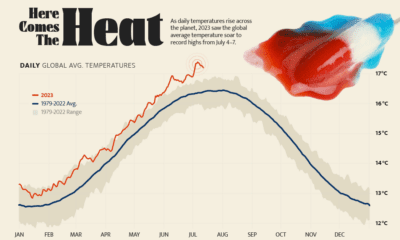
 Environment5 days ago
Environment5 days agoHotter Than Ever: 2023 Sets New Global Temperature Records
-

 Datastream4 weeks ago
Datastream4 weeks agoCan You Calculate Your Daily Carbon Footprint?
-
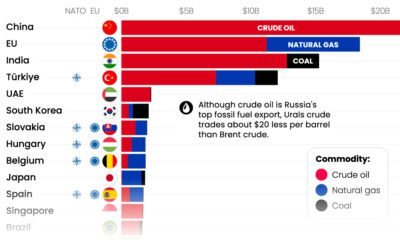
 Energy2 weeks ago
Energy2 weeks agoWho’s Still Buying Russian Fossil Fuels in 2023?
-

 VC+4 days ago
VC+4 days agoWhat’s New on VC+ in July
-

 Investor Education4 weeks ago
Investor Education4 weeks agoVisualizing BlackRock’s Top Equity Holdings
-

 Technology2 weeks ago
Technology2 weeks agoMeet the Competing Apps Battling for Twitter’s Market Share
-
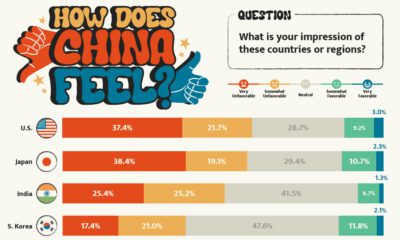
 Misc15 hours ago
Misc15 hours agoHow Do Chinese Citizens Feel About Other Countries?
-

 Markets4 weeks ago
Markets4 weeks agoVisualizing Every Company on the S&P 500 Index




